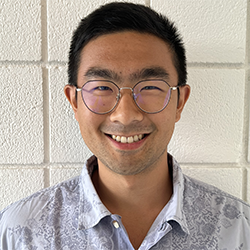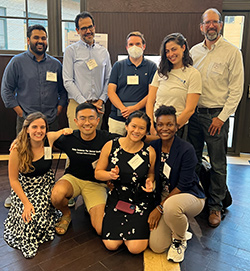Applying Technical Knowledge for Social Good
Charles Cui joined the Data Science for Social Good summer fellowship program at Carnegie Mellon University
 From June through August, Northwestern Engineering’s Charles Cui joined a diverse cohort of fellows — including trainees in computer science, geography, public administration, psychology, sociology, and statistics — for the Data Science for Social Good (DSSG) training program at Carnegie Mellon University.
From June through August, Northwestern Engineering’s Charles Cui joined a diverse cohort of fellows — including trainees in computer science, geography, public administration, psychology, sociology, and statistics — for the Data Science for Social Good (DSSG) training program at Carnegie Mellon University.
In partnership with nonprofit organizations and government agencies, the 22 fellows applied data science, machine learning, and artificial intelligence (AI) approaches to address high-impact projects in areas including education, public health, public safety, transportation, criminal justice, and environmental issues.
Cui, a third-year PhD student in computer science, joined Tejumade Afonja (computer science, Saarland University); Paula Subías-Beltrán (AI ethics, University of Barcelona); and Irene Tang (linguistics, University of Chicago); technical mentor Kit Rodolfa (Carnegie Mellon University); and project manager Abiola Oyebanjo (Humboldt University of Berlin) for the project “Improving the National Suicide Prevention Lifeline’s Service through Better Call Routing.” The work was done in partnership with Vibrant Emotional Health, the administrator of the 988 Suicide & Crisis Lifeline (formerly known as the National Suicide Prevention Lifeline).
Cui is passionate about developing more robust and theoretically sound methods to tackle problems in human-computer interaction. Deeply involved in the computer science for social good community for several years, his research interests lie at the intersection of algorithms, data science, and human-computer interaction.
“I've craved the opportunity to build something that can have a more direct impact,” Cui said. “When I saw the opportunity for the summer fellowship, it was a no-brainer.”
A member of the Northwestern CS Theory Group, Cui is co-advised by Jason Hartline, professor of computer science; and Matthew Kay, assistant professor of computer science at Northwestern Engineering and of communication studies at Northwestern’s School of Communication.
Building a technical solution
Vibrant Emotional Health administers the national network of more than 200 locally and state-operated and funded crisis centers across the country that receives more than 2 million calls annually, with call volume expected to increase following the transition to the 988 Lifeline in mid-July.
Currently, the Lifeline routing system allocates calls to a call center, factoring in variables that affect the probability of the call being answered in a timely fashion, including call center capacity and current backlog of calls in the queue. Historically, nearly 20 percent of calls are abandoned due to long wait times while they are routed between call centers to locate an available counselor. Vibrant Emotional Health sought help from the DSSG program to identify strategies to reduce the number of lifeline calls that fail to connect to counselors.
Vibrant Emotional Health provided the fellowship team with three years of de-identified historical data from each call to the Lifeline, including the caller’s exchange code (first six digits of a phone number), the call center the call was routed to, the wait time, and whether the call was answered by a counselor. Using this data, the team built a machine learning model that predicts the likelihood of an incoming call being answered at a particular center at a particular time. The team found that their model performs 20 percent better than a simple data-driven approach.
 Next, the team applied their prediction model to design a routing simulator that reproduces what would happen to a set of incoming calls under a given routing system, allowing the team to evaluate the predicted performance of any routing system. Then, the team generated a small set of potential routing system candidates subject to the contractual constraints of the Lifeline — such as neighbor agreements allowing overflow calls from one state to be answered by a partner state — and evaluated them using the routing simulator.
Next, the team applied their prediction model to design a routing simulator that reproduces what would happen to a set of incoming calls under a given routing system, allowing the team to evaluate the predicted performance of any routing system. Then, the team generated a small set of potential routing system candidates subject to the contractual constraints of the Lifeline — such as neighbor agreements allowing overflow calls from one state to be answered by a partner state — and evaluated them using the routing simulator.
“In preliminary results, our system found a routing system that has a one percent increase in the overall answer rate,” Cui said. “Upon validation by our partner, this one percent would translate to 20,000 more people getting helped every year. We believe, with more work, the routing system can be further optimized, and more people would be able to receive the support they need in a timely and equitable manner.”
Cui explained that the scope and scale of the fellowship projects were obviously too great to be fully solved by students in a 12-week program.
“The goal of the summer fellowship is to develop version one of a usable technical solution that our partner organizations can build on,” Cui said. “We offered Vibrant Emotional Health a plan to validate our model on a small part of their large network to test if it is behaving according to what we predicted. Once they receive validation, they can deploy our system on a larger scale.”
Focusing on the human impact
The fellowship project helped Cui contextualize the technical solution within the challenging framework of social good initiatives.
“You're going to help some, but not others. And how do you choose to help?” Cui said. “That's definitely a weight that we all felt. But it's also the nature, perhaps, of tackling any social issue.”
Cui also learned early-on in the DSSG program how building faulty assumptions into technical solutions can be detrimental to the ultimate project goal.
“My background is in mathematics and theoretical computer science, so I feel very comfortable if I can see a mathematical expression that can be maximized or minimized,” Cui said. “Very quickly, I started trying to turn the goal into a math problem and turn people into numbers.”
Rodolfa advised Cui to step back and consider the goal: to improve the Lifeline’s service so that more people in need of mental health support can receive the help they need. He asked Cui questions to expose the assumptions Cui had made to devise his equations.
“I realized if the assumptions I made are not true, then however beautiful the technical solution is, it doesn't matter,” Cui said. “If the assumptions don't hold in practice, your technical solution does not matter at all. And that's when I started thinking about the human impact, because assumptions matter and, for projects like this, you must be very explicit and honest about the assumptions that you're making.”
Given the value and importance of consulting with domain experts to field test assumptions and proposed solutions, every fellowship team visited their partner organizations to better understand their stakeholders and their concerns. Cui and his team talked with crisis counselors at a Pittsburgh call center.
“We talked to the people who pick up these calls on a daily basis, and we asked them about their jobs and what we could do to help make their jobs better,” Cui said. “We're not just sitting in front of our computers and crunching numbers. We're talking to these human beings to learn about the issues they're facing on the ground and really focus on the human impact.”
Applying technical skills for social good
Cui earned a bachelor’s degree in mathematics and computer science from Oberlin College. One of his mentors at Oberlin, Samuel Taggart (PhD ’17), was also advised by Hartline in his PhD program at Northwestern CS.
Taggart, currently assistant professor of computer science at Oberlin College, introduced Cui to Mechanism Design for Social Good (MD4SG), a multi-institutional initiative uniting researchers, policy-makers, community organizations, and industry practitioners to collaborate across domains toward the broader mission of social good. Cui co-led the MD4SG data economies and data governance working group from fall 2021 through spring 2022 and is now a co-organizer of the organization.
“I started college as a simple-minded math guy who likes to solve equations,” Cui said. “But gradually I grew to become a person who cares more about how I can use math to make the world a better place, and I was very lucky to meet a community of people that wants to use their technical skills to do something meaningful to help people.”
Cui said the speed of technological advances and innovations in computational systems has outpaced the ethical consideration of resultant social issues such as biased algorithms, the spread of misinformation, and the manipulation of data.
“A lot of academics and practitioners in computer science and data science care about these problems, and they care about how they can use their skills to solve these problems,” Cui said.
Cui is currently collaborating with Kay and Lily Ge, a first-year PhD student in computer science, to develop a test to assess people's ability to reason about and critically interpret potentially misleading and erroneous visualizations.
“In all forms of media there are a lot of misleading or deceptive visualizations, created intentionally or unintentionally, that lead to misinformation,” Cui said. “We're developing a test to assess people’s ability to critically interpret and reason about such visualizations. This is a first step towards a line of future research that aims to help people improve their ability to extract accurate information from data visualizations and battle visualization misinformation.”
